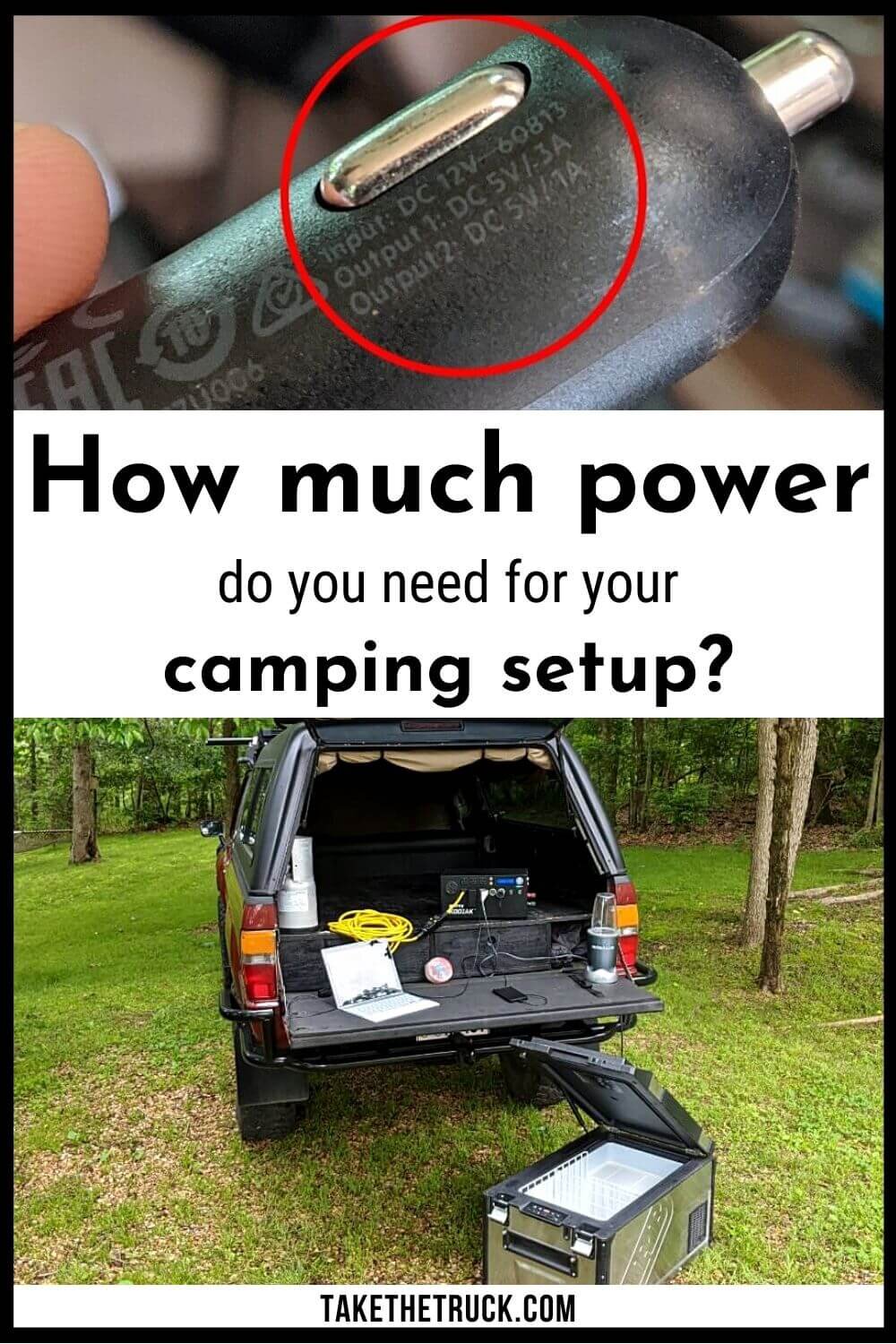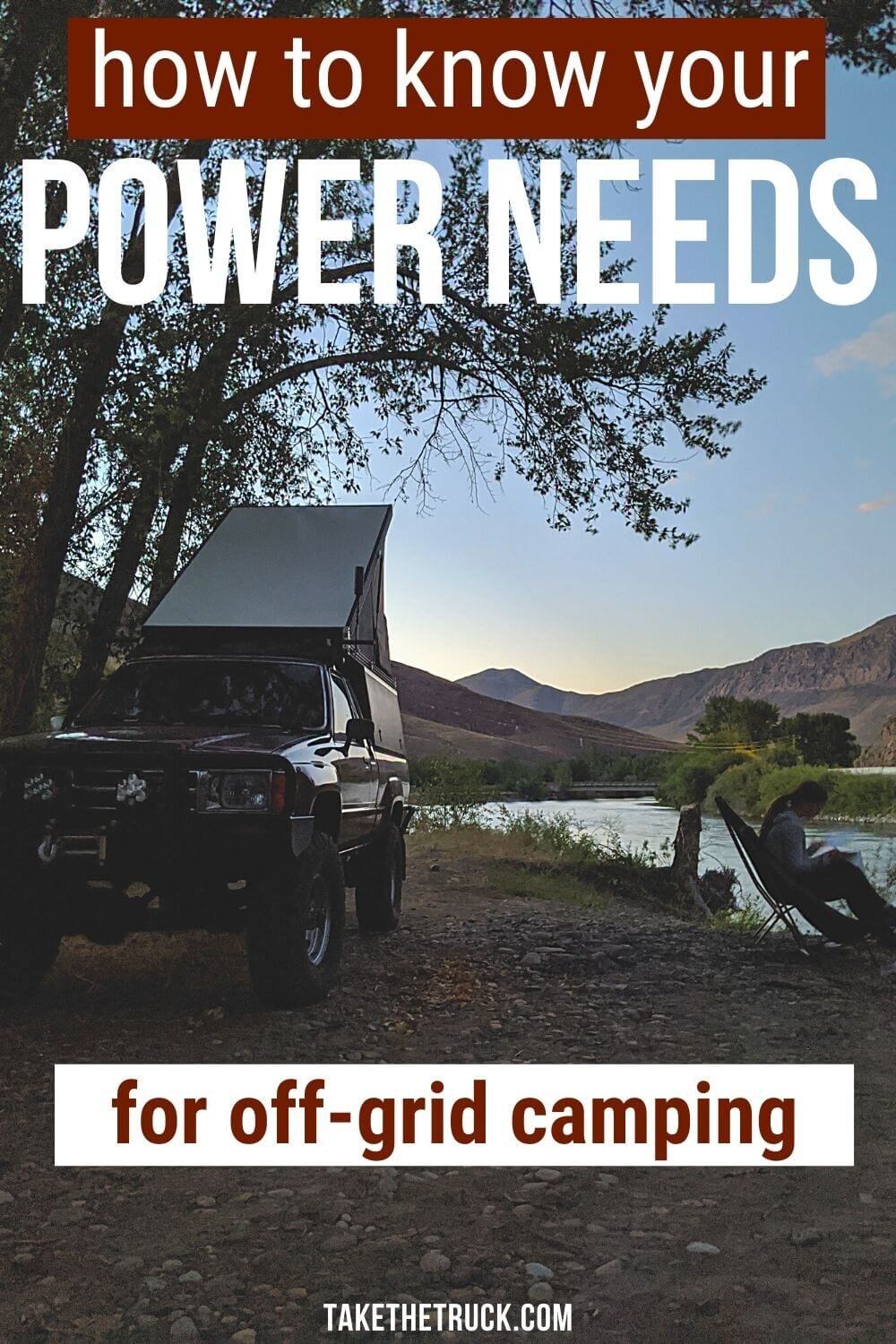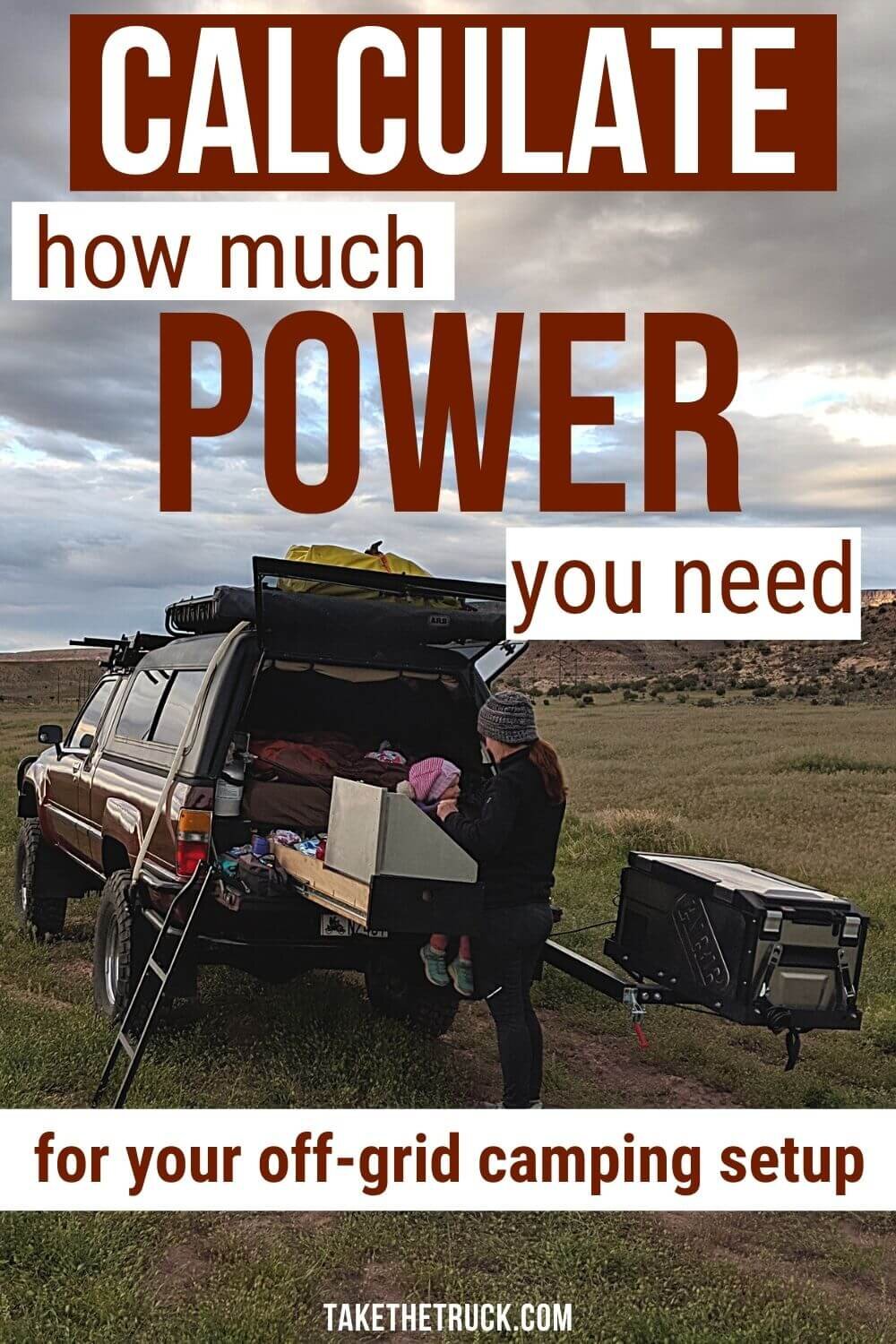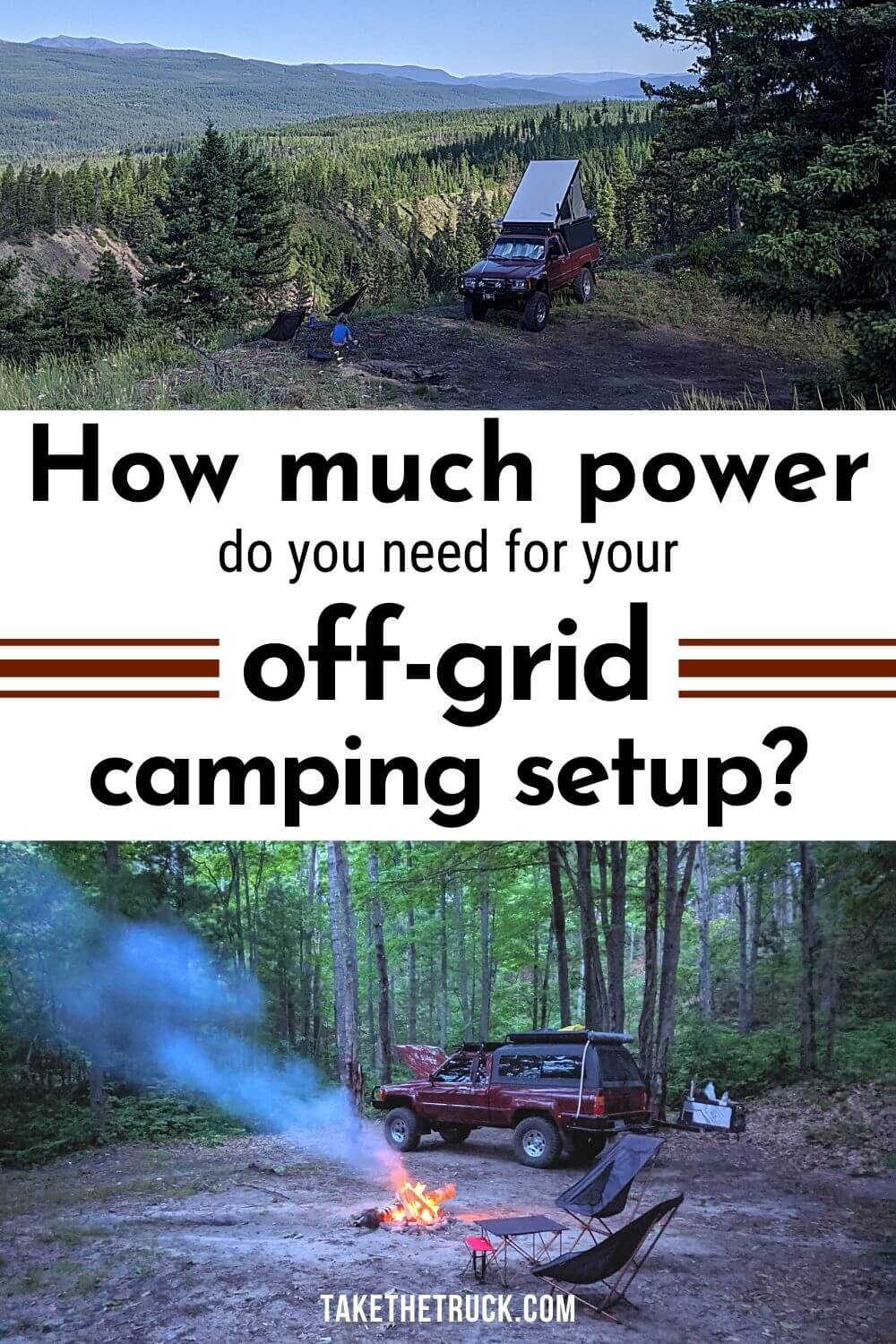Portable Camping Power Part 2 - Determining Your Power Supply Needs
When selecting a camping power supply or designing a dual battery setup, one of the first things you need to do is look at ALL the devices you want to power or charge while camping. Then estimate their daily power consumption - so you can determine your daily power needs while camping.
First you may want to start by getting familiar with camping power terms and the basic principles of how camping power works.
*(This post contains affiliate links. This means we may receive a small commission, at no additional cost to you, if you make a purchase through a link. See our full disclosure.)
Two Ways to Calculate Your Daily Power Needs
You can calculate your daily power needs while camping in one of two ways:
1. Use a Watt Meter
A watt meter is a tool that measures power usage/demand of various devices. You simply plug the device you want to measure into the watt meter and plug the watt meter into an appropriate (DC or AC) power outlet. The watt meter will provide a read-out of the device’s power consumption in Watt-Hours (Wh).
Then you simply multiply this by the number of hours per day you expect to use the device while camping. It’s a fast, easy, and accurate way to determine the camping power needs of each device you want to power while camping.
For low-amp DC powered devices charged by USB, like cell phones and laptops, you can use one of these*
For high-amp DC powered devices, like 12v fans, a camping fridge, or 12v ovens you can use one of these* - Note: you can also use this to monitor solar panel output if you decide to integrate that into your camping power system
For AC powered devices, like the power tools, blenders, crockpots, etc you use at home you can use one of these*
2. Manually Calculate Each Device’s Power Need
You can look at each of your devices’ power supply labels, manuals, or manufacturer’s spec sheets and use the below formula to get a fairly good idea of their daily power needs in Watt-Hours:
Daily Power Need (in Watt-Hours) = Expected number of hours the device will be used per day x Amps per hour drawn by the device (generally found on the device or it’s power supply label) x Voltage it operates at (also found on the label)
Daily Power Need (in Wh) = Est Hours of Use X Amps X Volts
In the image above you can see the manufacturer’s label on our cell phone car charger gives us the following info:
Input: DC 12V - this tells us the type of voltage (12 Volt) the charger itself is compatible with
Output 1 (fast charging): DC 5V/ 3A - this tells us it can output as much as 3 Amps at 5 Volts DC (or 15 watts) to our cell phones while fast charging
Output 2 (slow charging): DC 5V/ 1A - this tells us it can output as much as 1 Amp at 5 Volts DC (or 5 watts) to our cell phones while slow charging
Note: Device power labels often list the MAX power a device may consume in these Amp and Volt figures, so their average power use may be less.
We know from using our phones at home that it takes about 1 hour to fully charge each of our cell phones and a charge will typically last one full day while camping (we have two phones so 2 hours total of charge time)
SO our Total Cell Phone power usage per day = 2hrs x 3 Amps x 5 Volts = 30 Watt-Hours (Wh) of power per day required to use this device while camping!
More Examples of Calculating Camping Power Needs
Camping Fridge
Our ARB Elements Weatherproof Fridge draws 0.89 amps per hour on average on 12 Volt DC, and it runs 24 hrs a day when we’re camping and traveling
So a day's power usage is 24 hrs x 0.89 amps x 12 volts = 256.32 wh
2 Cell Phones
Our cell phones draw at most 3 amps at 5 Volts when fast charging and take about 1 hour each (so 2 hrs total) to fully charge and a charge is good for 24hrs
So a day's usage is 2 hrs x 3 amps x 5 volts = 30 wh
A Laptop
Our laptop draws about 15 amps when fast charging and takes about 1 hour to fully charge but a charge is good for 48hrs on average while camping
So a day's usage is 0.5 hrs x 15 amps x 12 volts = 90 wh
A Vent Fan
The MaxxFan Deluxe vent fan we installed in our truck shell camper uses about 4.5 amps when running full blast, but we normally run it at 70% speed at most, which draws 2 amps and we only use it when we’re sleeping in the heat (about 8 hrs)
So a day's usage is 8 hrs x 2 amps x 12 volts = 192 wh
Lighting
All of our truck bed camper interior lights are 12v LED and are used so minimally (less than 20 minutes) that they hardly register - less than 1 amp
So a day’s usage is 0.2 hr x 1 amp x 12 volts = 2.4 wh
So if we were to use everything on the same day and need to charge both our cell phones and laptop from completely dead [basically worst-case scenario], we would need around 571 watt-hours per day.
Note that real consumption is typically far less than this, but this gives a good baseline to make camping power supply decisions off of.
What Type of Camping Do You Typically Do?
Before deciding on a specific camping power supply, take some time to consider the type of camping you typically do:
Weekend Camping vs Multi-Week Camping Road Trip?
Weekend Camping you can get by with much less power
If you’re planning week-long or multi-week wild camping trips, you’ll want a more consistent and robust camping power supply
Vehicle Camping vs Tent Camping vs Backpacking?
If vehicle camping, often your vehicle itself can act as, or house, your camping power supply
If Tent Camping or Backpacking your space is much more limited, and so the portability of your camping power supply becomes more of a factor
Are you camping solo or with a group?
The more people in your group, the more devices that need to be charged - and they’ll have to be factored into your daily camping power need calculations as well
All these factors will have a huge impact on what camping power supply best fits your total power needs off-grid.
NOW IT’s Your Turn: Camping Power Need Estimator
You can download our blank Camping Power Need Estimator to help with your own calculations by clicking the button below:
You may find that you require more or less power depending on how many devices you need to power and how much you use those devices while camping. Just keep in mind:
The more devices you bring camping, the more power you’ll need.
And the more power you need, the more expensive your camping power supply will be.
Once you have your TOTAL daily camping power need calculated, it’s time for the fun part - selecting a camping power supply!
Please subscribe, and as always, thanks for reading!
Related Posts:
Portable Camping Power Part 1: Electrical Terms and Principles Made Simple
Portable Camping Power Part 3: Selecting a Camping Power Supply
Everything You Need to Know About Solar Generators for Camping
Portable WiFi for Camping, Traveling, and Working Remotely [in 2020]
Wild Camping Safety & Security Tips: Conquer Your Boondocking Fears
Pin me to your camping board!
If you found this post helpful, please share it!








